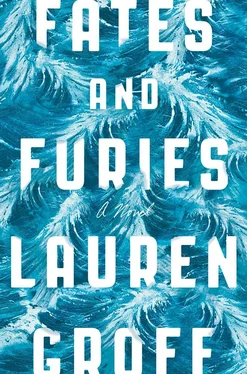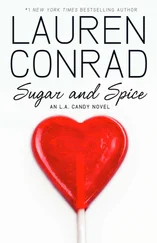To stay away from the house, she joined the time-intensive clubs at school that didn’t require her to speak. She swam and joined the chess team and learned the flute for the band, a thoroughly demeaning instrument, she felt, but easy to master.
In the height of her happiness many years later, she would think of that solitary little girl, face downturned like a demure fucking bellflower, while inside there was the maelstrom. She’d want to smack that kid hard. Or pick her up in her arms and cover her eyes and run somewhere safe with her.
Instead, her uncle adopted her when she was twelve. She wasn’t aware he was going to until the day before the court hearing. The driver told her.
He’d gained so much weight over the year that his stomach had grown a little stomach. When he was lifting her groceries to the trunk, she had the urge to bury her face in the many pillows of him.
“Adopted! Isn’t that nice?” the driver said. “Now you needn’t worry, mamzelle , about having to go somewhere else. You belong here now.”
When he saw her expression, he touched her — was it the first time he’d touched her? — on the crown of the head, and said, “Oh, girl pie. Don’t take it so hard.”
On the ride home, her silence was like the fields they were passing. Ice-wracked, weary with blackbirds.
Inside the car, the driver said, “I’m supposed to call you Miss Yoder now.”
“Yoder?” she said. “But that wasn’t my grandmother’s name.”
The driver’s eyes in the rearview grew merry. “They say your uncle changed his name to the first thing he saw when he got to Philly. Reading Terminal Market, it was. Yoder’s pies.”
Then a flash of alarm in his face, and he said, “You won’t tell I said so.”
“Who would I tell? I don’t talk to anybody but you,” she said.
“Sweet thing,” he said. “You break my heart. You do.”
The day Mathilde turned thirteen, she found one door downstairs unlocked and open a crack. Her uncle must have left it for her just so. For a moment, the hunger in her tipped over and she couldn’t suppress her curiosity. She entered. It was a library, with leather couches and Tiffany lights, and save for a glass cabinet that held what Mathilde would later find out to be antique Japanese erotica, she could reach all of the books in the room without stretching. They were strange things, ancient hardcovers that seemed, despite their similar deckled edges and cloth bindings, to be gathered randomly. In her sophisticated years, she’d understand that these were books sold by the yard, mostly for decorative purposes. But in those bad years, in her early teens, they were volleys from a kinder Victorian world. She read them all. She was so versed in Ian Maclaren and Anthony Hope, Booth Tarkington and Winston Churchill [the American], Mary Augusta Ward and Frances Hodgson Burnett, that the sentences in her English papers became ever more ornate and elaborate. American education being what it is, her teachers took her rococo sentences to be evidence of a prodigious facility with language that she didn’t actually have. She won all the English awards her last year in middle school. She won them all in high school, also. On her thirteenth birthday, she thought, closing the library door behind her, that at this rate she would know what was in every room of the house by the time she was thirty.
Except that, one month later, her uncle left a door unlocked unintentionally.
She wasn’t supposed to be home. She had walked back from school because of the half day called — there was a brutal snowstorm on the horizon — and the chauffeur couldn’t be reached on the office phone, and she missed the bus anyway. She walked in the freezing cold, her bare knees numbed after five minutes. She pushed the last two miles in a sideways wind with her fingers making blinders to keep the snow out.
When she came back to the stone house, she had to crouch on the doorstep with her hands under her bra to warm them enough to work the key. She heard voices inside, at the end of the hall where the library was. She took off her shoes, feet blocks of ice, and crept to the kitchen, where there were half-eaten sandwiches on the counter. A bag of chips splayed its barbecue guts. Someone’s cigarette burned in a teacup, quarter inch of ash. In the windows, the storm was almost black.
She tried to go toward the staircase noiselessly but stopped short: under the stairway there was a small room, and she’d never seen the door open until now. She heard footsteps and stepped inside, quietly shutting the door. The overhead light was on. She flicked it off. She crouched behind a strange statue of a horse head and breathed into her hand. The footsteps passed. There were loud male voices and more steps. In the dark, her warming skin was full of chewing ants.
The great front door slammed, and she waited and waited, but she could feel that the house was empty and that she was alone.
She turned the light on and saw what she’d only vaguely seen before. Along the wall there were canvases with their faces turned away and little pieces of statuary. She picked up a painted board. It was heavy, solid. She turned it around and almost dropped it. Never in her life had she seen a more perfect thing. At the bottom, in the foreground, there was a curvy white horse with a man in blue robes riding it, the fabric so lush she touched it to make sure it wasn’t real. Behind him were other men, other horses, a jagged rock face. Up against the blue sky was a soft, pale city so perfect it seemed made of bones.
She memorized it. At last she put it back down and took off her sweater to wipe up the snowmelt that had dripped onto the floor from her hair and clothes. She closed the door behind her and felt a keen loss when she heard the lock fall into place.
She went up the stairs and lay in the dark with her eyes closed to resee the panel. When the chauffeur came in, calling worriedly for her, she reached out her window, gathered two handfuls of snow, put both on her hair, and ran to the kitchen.
“Oh, girl,” he said, sitting heavily down. “I thought we lost you in that storm.” She didn’t mind that his concern had been for both of them, that if he had, indeed, lost her he would have been in danger himself.
“I got in a few minutes ago,” she said, still shivering, and he took her hand and felt how cold it was and made her sit and made cocoa from scratch, then chocolate chip cookies, too.
—
FOR HER FOURTEENTH BIRTHDAY, Mathilde’s uncle took her out to dinner. In three years, they had never shared a meal. She’d opened her bedroom door to see the red dress he’d laid on her bed like a skinny girl thrown backward. Beside it was her first pair of high heels, three inches tall and black. She dressed slowly.
The restaurant was warm, a converted farmhouse not unlike her uncle’s, but with a fire burning in the hearth. Her uncle looked ill in the golden light, as if his skin were candle tallow, half melted. She steeled herself to look at him while he ordered for both of them. Caesar salad. Steak tartare with a quail’s egg atop, followed by filet mignon. Side of roasted potatoes and asparagus. Côtes du Rhône. Mathilde had been a vegetarian since she saw an exposé on television about industrial husbandry, cows hung on hooks and flayed alive, chickens squeezed into cages that broke their legs and living out their days caked in their own shit.
When the salads came, the uncle twirled a brown anchovy on his fork and congratulated her, in French, for being so poised and self-sufficient. He swallowed without chewing; like a shark, she knew from television.
“I have no choice. I’ve been left entirely alone,” Mathilde said. She hated herself for allowing her mouth to twitch and betray her.
Читать дальше












